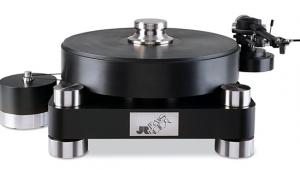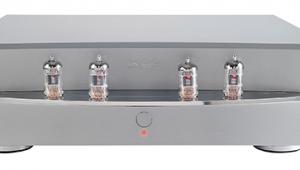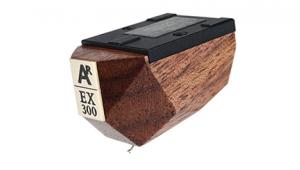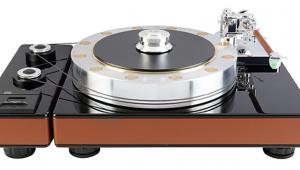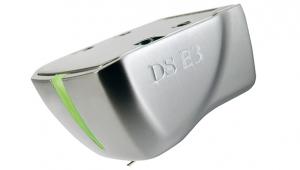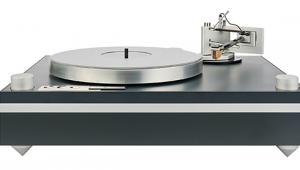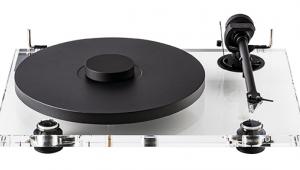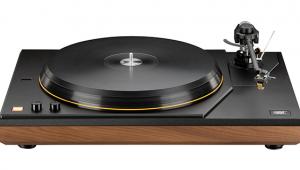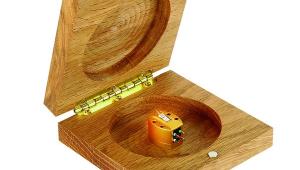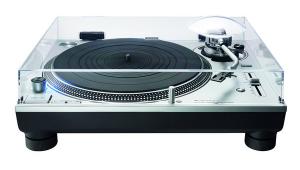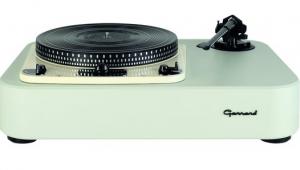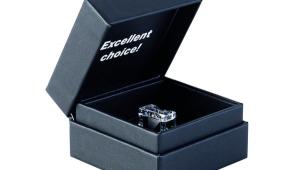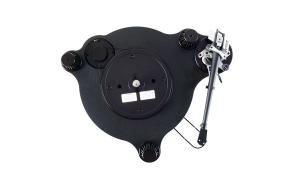Lyra Delos (£900)
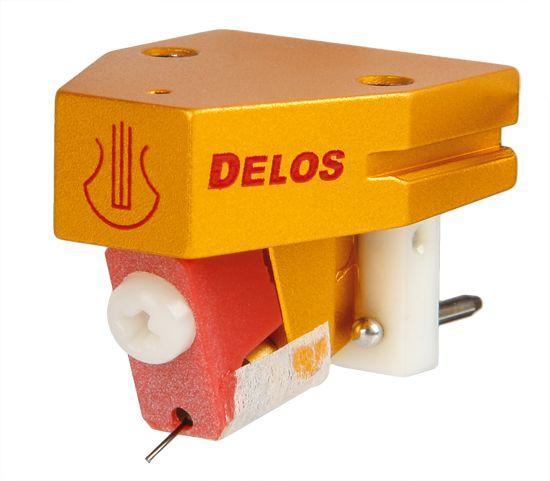
The Delos is the latest in a long line – the baby of the range it’s designed to be tonearm and phono-stage friendly: of medium weight and compliance it pushes out a claimed output of 0.6mV at 5cm/sec. Recommended phono stage loading is from 98ohm to 806ohm (Lyra says the final value should be determined by listening). Step-up transformer users should expect a 5 to 15ohm load and the transformer’s output should be connected to a 10kohm to 47kohm MM-level RIAA input, says Lyra.
The cartridge body is skeletal and machined from a solid 6063 aluminium billet, which is partially non-parallel in its shape to help minimise resonances. High purity (6N) copper signal coils are fitted, with square-shaped high-purity iron formers. A solid boron cantilever is mounted directly into the cartridge body via a novel asymmetric single-point suspension system, and a Namiki microridge line-contact nude diamond stylus is used.
Thanks to the clever stylus guard design the cartridge proved relatively easy to install into our SME Series V tonearm atop a Michell Gyrodec, and it tracked rock-solidly at the recommended 1.75g.
Like a ballerina
The Delos shows itself to be a balletic performer, possessed of a far more graceful, supple and lithe sound that you have a right to expect for under £1000. Essentially it’s a very neutral device, with just a touch of extra energy towards the high frequencies – but it’s so civilised that it never once seems so much as forward, let alone harsh.
Scritti Politti’s ‘Small Talk’ [Virgin 25VC-1028] showed the Lyra’s amazing blend of couthness and lyricism; the song’s complex, high tempo sequenced percussion is something of a white-knuckle ride for any cartridge, but the Delos proved utterly unflustered. It was able to throw out vast amounts of detail and thread it altogether in a fluent and musically communicative way, never once getting fazed by the crashing Yamaha DX7 keyboard stabs or singer Green Gartside’s falsetto vocals.
Moving to some classic 1970s rock, Al Stewart’s ‘Year Of The Cat’ [RCA RVP6166] served up that smooth Abbey Road studio sound with voice hovering ethereally over the recorded acoustic. Still, this cartridge didn’t get all ‘nostalgic’, giving instead an extremely spry rendition. The Delos has massive speed, so the strummed steel-string guitars came over with great impact, and it was able to signpost their percussive significance to the song brilliantly. Such delicacy and insight extended to the treble too – the hi-hats and ride cymbal work was totally devoid of splash or sibilance yet possessed a wonderfully authentic steely ring.
Dynamically it impressed too: Alphonse Mouzon’s pile-driving ‘By All Means’ is a late-’70s jazz-funk standard [MPS] with Herbie Hancock bashing the ivories over Mouzon’s virtuoso drumming. The Delos caught the spaces between the notes deftly, making the beat all the more impactful. Better still, it was able to carry the phrasing of the musicians artfully, showing this classic song to be the roof-raiser that it really is.
Despite serving up a rock-solid bass-drum and snare sound, allied to a super-taut bass guitar and sparkling hi-hats, it still had enough left to render the choppy rhythm guitar and raspy brass brilliantly.
A 1962 Karajan recording of Beethoven’s Pastoral Symphony with the BPO [DG] showed the beauty of classical music from vinyl, with a wonderfully atmospheric and immersive recorded acoustic, seemingly falling back forever. This pick-up doesn’t inject artificial body and bulk into solo instruments as some more euphonic designs can, but instead chooses to lock on to them and project them in correct proportions with tremendous solidity and composure.
Verdict
The Lyra Delos has abilities that transcend its price point. Technically brilliant and musically accomplished, it does everything you could reasonably expect of it, and more. Indeed it is so good that it may make prospective purchasers of pricier Lyras wonder why they’re spending the extra.
Originally published in the 2013 yearbook


